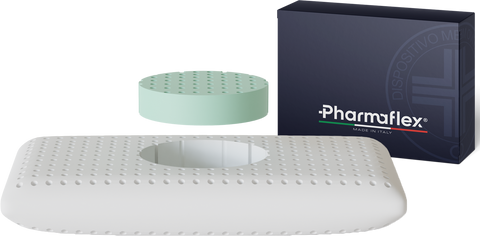
Cuscino neonato: quando è bene iniziare ad usarlo
Nella vita di un neonato, ogni dettaglio conta, soprattutto quando si tratta del suo benessere e comfort. Ti sarai sicuramente chiesto, come molti altri genitori, se e quando sarebbe opportuno introdurre un cuscino da neonato per il tuo piccolo.
Mentre alcuni pediatri suggeriscono che un cuscino possa offrire sollievo in certe circostanze, altri sostengono l'importanza di evitare qualsiasi accessorio che possa interferire con la naturale postura della spina dorsale del bambino.
Questo argomento, come puoi immaginare, è circondato da una moltitudine di opinioni e raccomandazioni. In questo articolo, ti accompagneremo attraverso le informazioni essenziali, per aiutarti a comprendere meglio quando e come utilizzare il cuscino neonato.
Quando mettere il cuscino al neonato: il momento giusto
Quando ti trovi di fronte alla decisione di introdurre o meno un cuscino nella culla del tuo bambino, la sicurezza dovrebbe essere sempre la tua priorità principale. Dopotutto, si tratta del benessere del tuo piccolo, e ogni scelta dovrebbe riflettere il suo miglior interesse.
In campo pediatrico, alcuni esperti ritengono che i cuscini possano essere introdotti in presenza di evidenti disagi del bambino, come un riposo irrequieto, altri sottolineano l'importanza di lasciare il neonato a contatto diretto con la superficie del materasso. Questo per garantire una postura corretta e per evitare possibili complicazioni alla spina dorsale.

In questo scenario, è essenziale considerare le fasi della crescita del tuo bambino. Ogni età porta con sé modi di dormire ed esigenze differenti. Ad esempio, come sottolineato dall'Organizzazione Mondiale della Sanità, si consiglia di iniziare ad utilizzare il cuscino quando il bimbo ha raggiunto un'età compresa tra i 18 e i 24 mesi. Questo perché, in questo arco di tempo, i rischi si riducono notevolmente e la struttura cranica del bambino si sviluppa completamente, riducendo il pericolo di soffocamento o di postura innaturale.
I potenziali rischi e benefici associati all'uso di un cuscino neonato
Parlando dei rischi, il principale concerne il pericolo di soffocamento. Nei primi mesi di vita, quando il bambino non ha ancora la capacità di muoversi autonomamente, la presenza di un cuscino potrebbe rappresentare un ostacolo per le sue vie respiratorie. Inoltre, dato che la struttura cranica e vertebrale dei neonati è in rapida evoluzione, un cuscino inadeguato potrebbe determinare una postura innaturale, influenzando negativamente la corretta crescita della spina dorsale e del collo.
D'altro canto, ci sono anche potenziali benefici associati all'uso di un cuscino. In situazioni in cui il neonato cerca attivamente un sostegno per la testa durante il sonno, un cuscino scelto con cura potrebbe offrire il comfort desiderato. Ad esempio, se noti che il tuo bambino esprime disagio mentre dorme, cercando di appoggiare la testa su coperte o peluche, un cuscino potrebbe rappresentare la soluzione per garantirgli un riposo tranquillo e ristoratore.
I tipi di cuscini specifici e le loro funzionalità
Quando si tratta del comfort e della sicurezza del tuo bambino durante il sonno, non tutti i cuscini sono creati allo stesso modo. Alcuni sono progettati con specifiche funzionalità, rispondendo a particolari esigenze legate alla crescita e allo sviluppo del neonato.
La plagiocefalia, conosciuta anche come "sindrome della testa piatta", è una deformazione cranica che può manifestarsi nei primi mesi di vita di un bambino. Questa condizione si verifica quando una parte della testa del neonato viene compressa, portando a una forma asimmetrica del cranio. Qui entra in gioco il cuscino per plagiocefalia, progettato per distribuire in modo uniforme la pressione sulla testa del bambino, prevenendo o correggendo questa condizione. Se noti che la testa del tuo bambino ha un aspetto irregolare o inclinato, potresti considerare l'utilizzo di questo tipo di cuscino, sempre previa consultazione con il pediatra.
Il Cuscino Memory Foam invece, grazie alle sue proprietà di adattabilità, è una scelta popolare per i cuscini destinati ai più piccoli. Questo materiale reagisce al calore del corpo, modellandosi delicatamente attorno alla testa e al collo del bambino, offrendo un sostegno ottimale e riducendo i punti di pressione.
Per i neonati e i bambini che mostrano segni di inquietudine durante il sonno o che hanno bisogno di un supporto aggiuntivo, un cuscino in Memory Foam può offrire un comfort superiore, assicurando al contempo una corretta allineamento della spina dorsale.
Oltre ai cuscini tradizionali, esistono cuscini ortopedici progettati specificamente per sostenere la crescita sana della spina dorsale e del collo del bambino. Questi cuscini tengono in considerazione la fragilità delle vertebre in crescita, offrendo un sostegno adeguato e prevenendo potenziali problemi posturali in futuro. L'uso di un cuscino ortopedico può assicurare che il bambino mantenga una postura naturale durante il sonno, favorendo un sano sviluppo della colonna vertebrale.
In conclusione, la scelta del cuscino giusto ha un impatto significativo sul benessere del tuo bambino. Pharmaflex offre una gamma di cuscini pensati appositamente per rispondere alle esigenze dei più piccoli, garantendo sia il comfort che la sicurezza durante il sonno. Prima di prendere una decisione, è sempre essenziale fare ricerche approfondite e, se possibile, consultare il pediatra per assicurarsi che la scelta sia la più adeguata alle esigenze specifiche del tuo piccolo.
